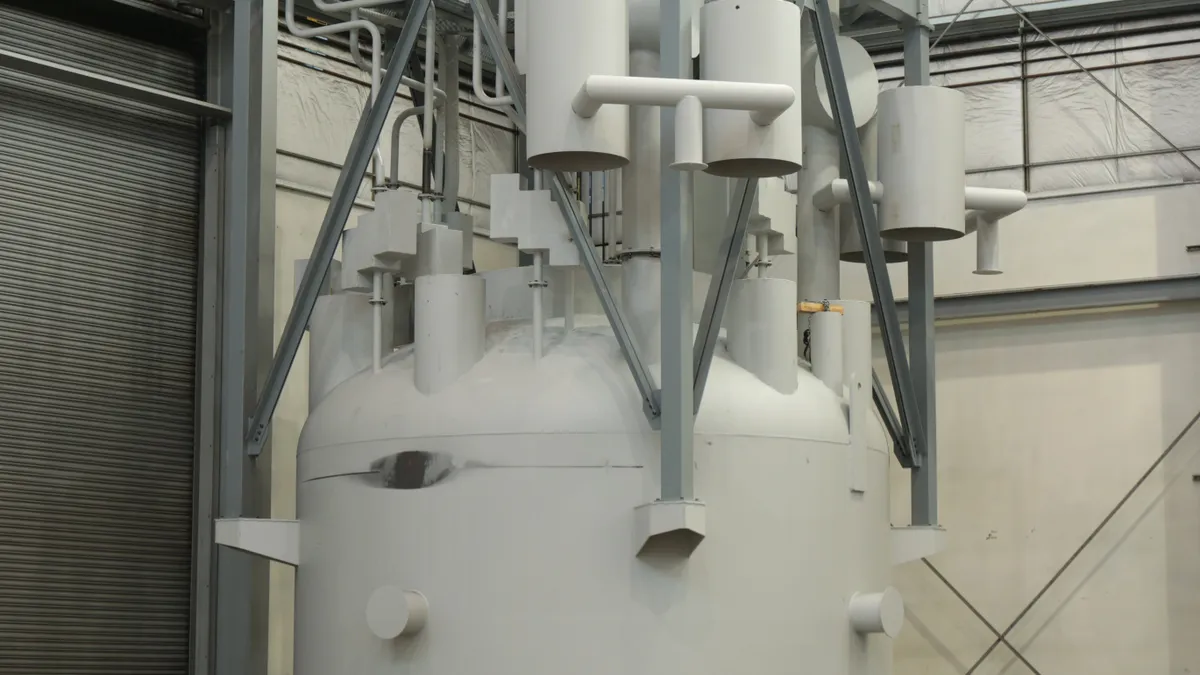Dive Brief:
- The Department of Energy said Friday it has approved a multi-year cost share award of up to $1.4 billion to help demonstrate a 12-module NuScale reactor at Idaho National Laboratory. The award is for a new entity, Carbon Free Power Project, LLC, a wholly-owned subsidiary of Utah Associated Municipal Power Systems (UAMPS), and the money is still subject to future appropriations from Congress, DOE noted.
- The award "serves as a funding vehicle," DOE said, and follows $160 million in total funding DOE announced on Tuesday for Terra Power and X-energy under the department's new Advanced Reactor Demonstration Program.
- DOE expects construction of the NuScale test reactor to begin at Idaho National Laboratory in December 2025, with the first power module operating by 2029.
Dive Insight:
As competitive pressures on existing nuclear reactors continue, the Department of Energy is pursuing a number of avenues to help develop a new generation of advanced reactors.
"DOE's recent agreement for UAMPS' Carbon Free Power Project is a big step forward in helping to lower the risk of first-of-a-kind advanced nuclear technologies like NuScale Power," Assistant Secretary for Nuclear Energy Rita Baranwal said in a statement. "This project will be instrumental in the deployment of SMRs around the world," she added.
NuScale's reactor has made some key advances recently in the licensing process, and in August its 50 MW design was the first of its kind to get safety approval from the Nuclear Regulatory Commission.
NRC staff found the design meets all safety requirements for the design certification stage of licensing, though some analysts, including Edwin Lyman at the Union of Concerned Scientists, have expressed concerns about the design's passive safety features.
According to the NRC, NuScale plans to apply in 2022 for standard design approval of a 60 MW version of its module, which will require additional review.
Carlos Hernandez, CEO of Fluor, the majority shareholder of NuScale, praised DOE's Oct. 16 funding announcement.
“Together with the U.S. Nuclear Regulatory Commission staff’s recent approval of NuScale’s design, this potential funding from DOE and Congress will help launch an important new sustainable, carbon-free base load energy technology," he said in an Oct. 19 statement.
But while NuScale may be the furthest along the approval road for advanced reactors in the U.S., there are a number of other projects in the works.
Under DOE's Advanced Reactor Demonstration program, TerraPower and X-energy will each receive $80 million in initial funding to build two advanced reactors that can be operational within seven years.
"The awards are cost-shared partnerships with industry that will deliver two first-of-a-kind advanced reactors to be licensed for commercial operations," DOE said in a statement.
TerraPower will demonstrate the Natrium reactor, a sodium‐cooled fast reactor with a high operating temperature, which, "coupled with thermal energy storage, will allow the plant to provide flexible electricity output that complements variable renewable generation such as wind and solar," DOE said.
"X-energy will deliver a commercial four-unit nuclear power plant based on its Xe-100 reactor design ... a high temperature gas-cooled reactor that is ideally suited to provide flexible electricity output as well as process heat for a wide range of industrial heat applications, such as desalination and hydrogen production," DOE added.
The Xe-100 reactor is an 80 MWe reactor that can be scaled into a 320 MWe power plant with X-energy's modular design, according to the company's website.
Maria Korsnick, president and CEO of the Nuclear Energy Institute, called DOE's $160 million funding announcement a "pivotal development," adding that its "investment will accelerate these advanced technologies from concept to deployment, moving even more carbon-free technologies to market."
The designs selected by DOE "will also be able to support non-electricity applications, opening the door for nuclear to play new roles in our nation’s efforts to decarbonize," she noted.















